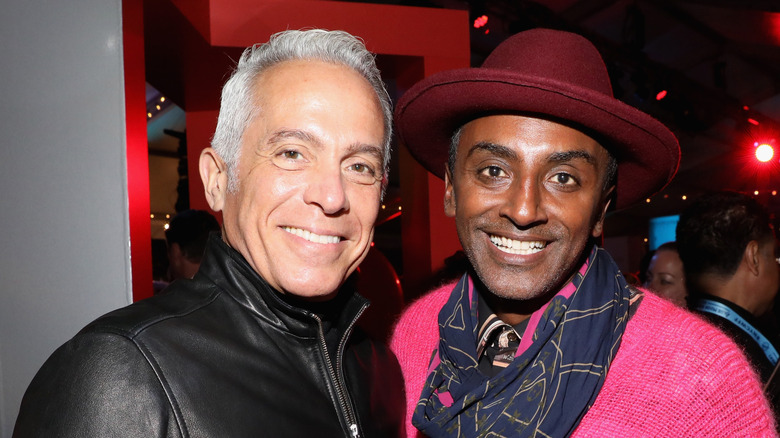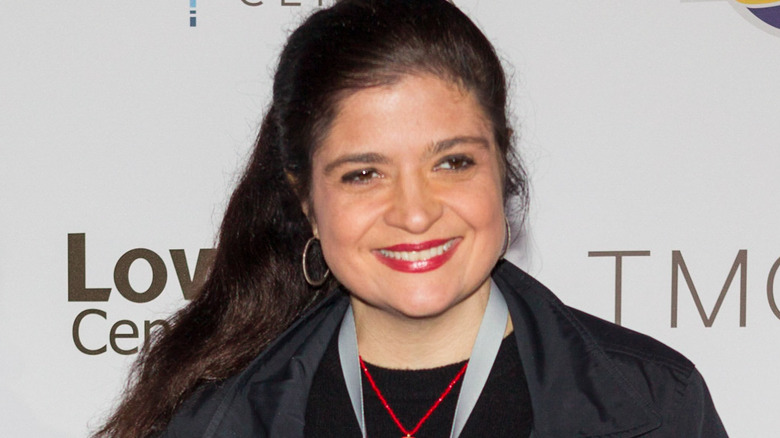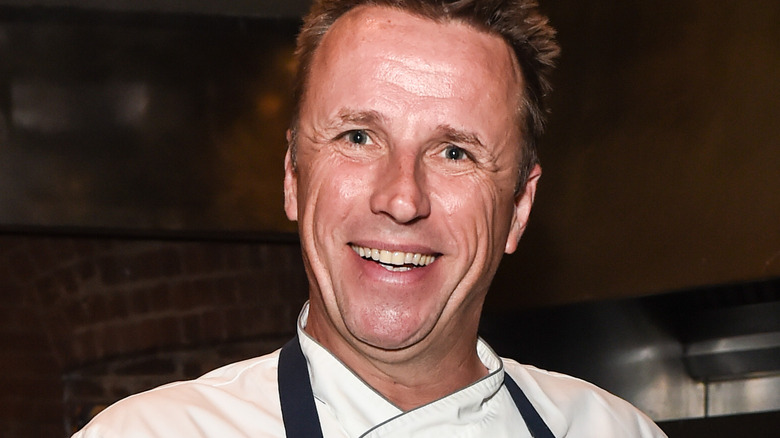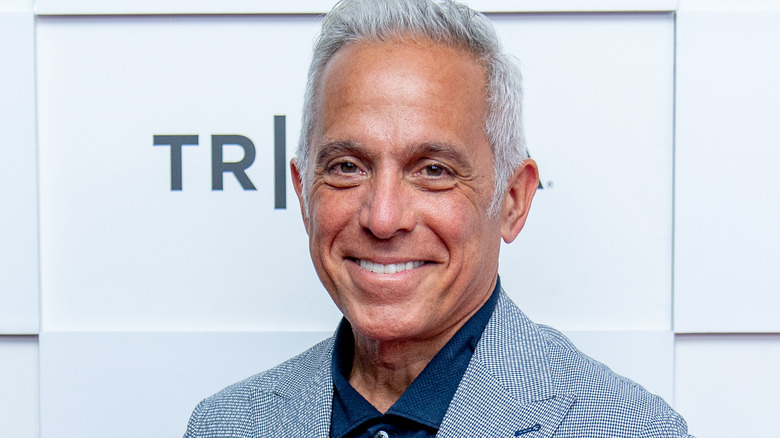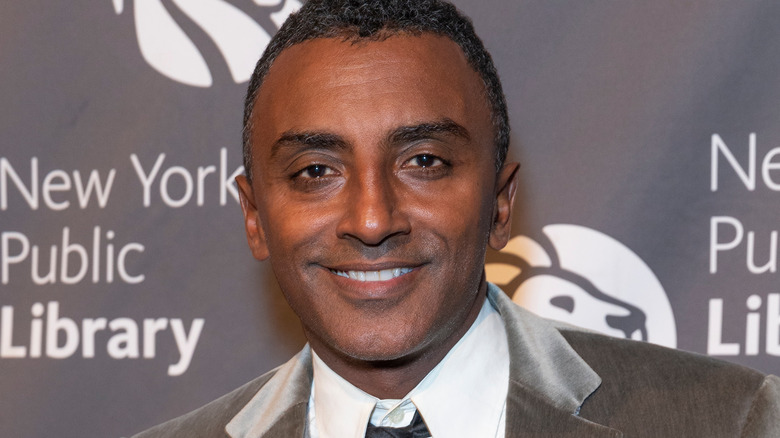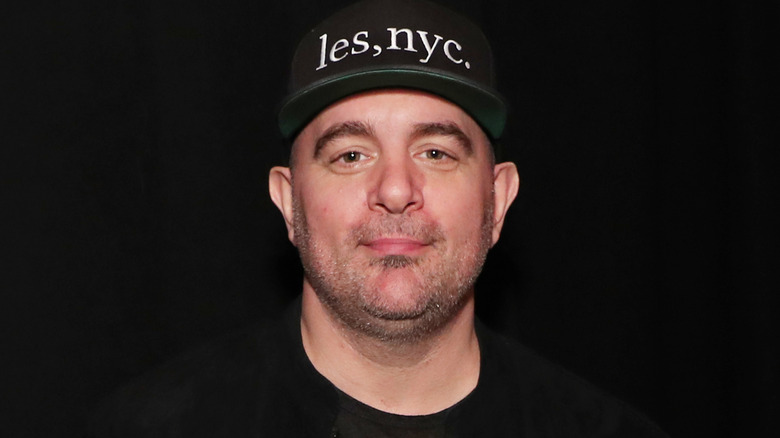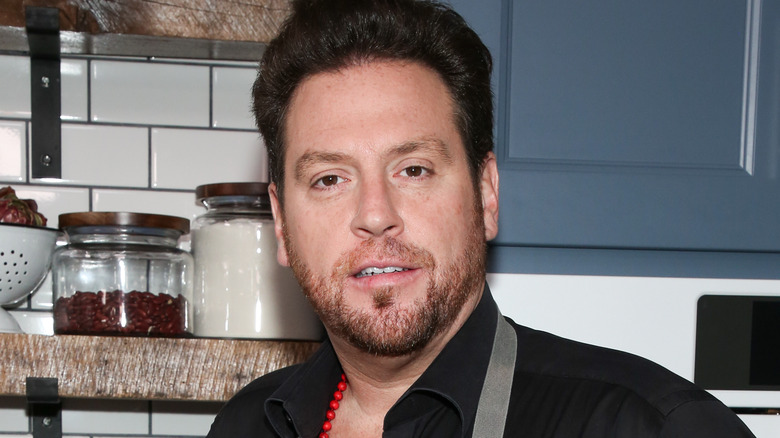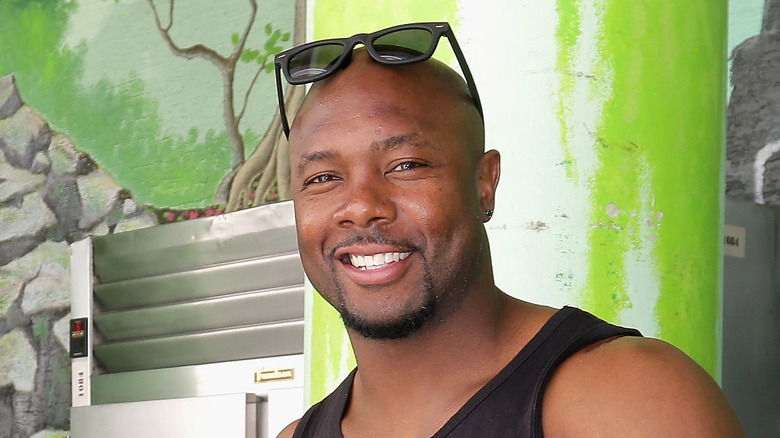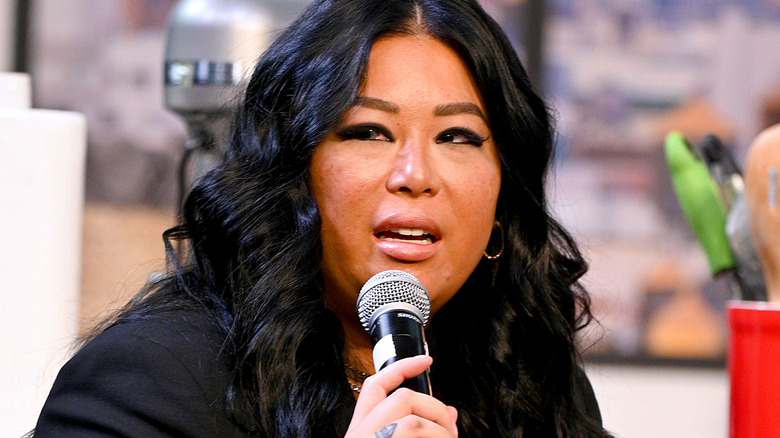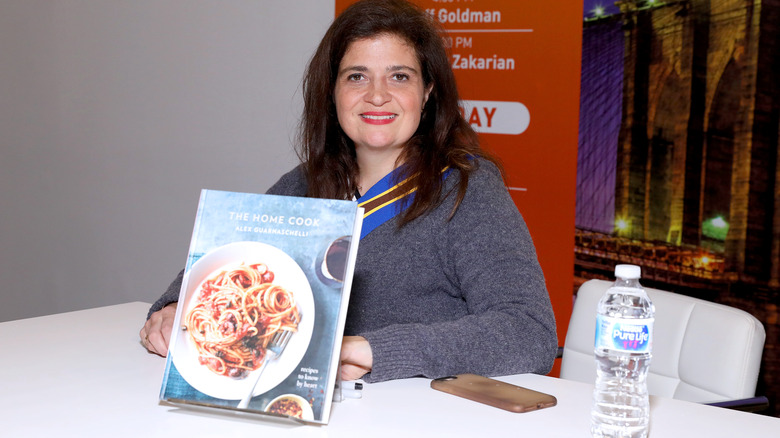The Truth About The Chopped Judges
We may receive a commission on purchases made from links.
Debuting in 2009, "Chopped" quickly surpassed "Supermarket Sweep" to become the most intense, pulse-pounding food-based game show of all time, as well as one of Food Network's signature, longest-lasting, and most prolifically produced shows. With more than 600 episodes (not counting spinoffs like "Chopped Junior," "Chopped All-Stars," and "Chopped: Impossible"), the format revolves around the same tantalizing notion: Four highly trained and experienced chefs head into a studio kitchen to create delicious dishes on the fly, showcasing random and often baffling ingredients given to them in a basket right at the start of each round. The actual results of the food produced in each of the three rounds may vary, but "Chopped" is always entertaining.
Judging the food created in this bizarre environment are a panel of experts — famous chefs, food writers, celebrities, and Food Network personalities — and "Chopped" has made the judges stars in their own right. Here's a look into the sometimes complicated professional and personal lives of the most familiar and noteworthy "Chopped" judges.
Alex Guarnaschelli got together with a Chopped contestant
The authorities of a game show — the judges and host — generally don't fraternize with the contestants. That way, the game is fair for everyone involved. But with "Chopped," the high-level food world is such a tight-knit scene that judges and competitors just might know each other outside of the show, and if that's the case, they try to keep the personal and professional separate.
Everything seems to be above board for the romantic relationship between "Chopped" judge Alex Guarnaschelli and two-time "Chopped" contestant Michael Castellon. The two have a lot in common: They're both chefs and restaurateurs, and they've both been on Food Network a lot — Guarnaschelli on various cooking shows and "Iron Chef" iterations and Castellon as a contestant on "Guy's Grocery Games," "Iron Chef America," and "Chopped." According to Today, they met before their paths crossed on "Chopped" — she dined at his New York restaurant and liked the food so much she asked to deliver her compliments to the chef. After four years as a couple, Castellon proposed to Guarnaschelli in 2020.
Dyslexia led Marc Murphy to professional cookery
Decades before he'd ever appear as a regular judge on "Chopped," chef and restaurateur Marc Murphy received a hands-on culinary education. His father worked as a diplomat for the U.S., so Murphy lived in food havens like Italy and France. He received his formal training at the Institute of Culinary Education, which admitted him despite bad grades in a traditional education setting as a child. "I'm extremely dyslexic," Murphy told Mashed in a exclusive interview. "And I, as a child, was constantly in trouble. I was constantly doing the wrong thing. I was getting terrible grades."
His high school guidance counselor advised skipping higher education in favor of getting a job because it didn't look like he'd get accepted to any college. "I thought cooking, if I could be good at that, I would be at least fed, which I was sort of happy about," he said. "I think that if I had been better off in school and done differently, I might not have headed down that path. That's where I say dyslexia might've helped me in my career path."
Murphy quickly fell in love with cooking and applied to culinary institutes, including ICE, from which he'd eventually graduate, and the rest is history.
Geoffrey Zakarian has spent a lot of time in court
Certainly the most stylish and well-dressed personality on Food Network, Geoffrey Zakarian is usually clad in a well-tailored suit and brings an affable, low-key, presence to shows such as "The Kitchen" and "Chopped," where he's judged more than 200 episodes. While his portfolio of restaurants keeps Zakarian busy off-camera, so have a few legal entanglements.
According to The New York Times, Zakarian filed for personal bankruptcy protection in 2011. That came in response to a $1.25 million class-action lawsuit filed by 152 former members of the kitchen staff at Country, Zakarian's defunct eatery in the ritzy Ritz-Carlton Hotel in New York City. The cooks and food preparers alleged that Zakarian, Country's co-owner and chef, failed on numerous occasions to pay the standard overtime rate of time-and-a-half, even went so far as to doctor labor records in order to pay staff less, and then charged the workers for staff meals that were never actually provided. In 2013, according to the Supreme Court of New York County, Zakarian and his management company settled the suit for $200,000.
Zakarian was then sued again in 2015 (via Eater). After then-presidential candidate Donald Trump made some controversial public remarks about undocumented Mexican immigrants, Zakarian cancelled a plan to open a restaurant in Trump International Hotel in Washington, D.C. Trump sued for millions, citing breach of contract, prompting Zakarian to countersue, alleging that Trump's comments were so over the top that they could void a contract. According to Eater, the matter was settled out of court.
Marcus Samuelsson was a war refugee as a child
Marcus Samuelsson's path to fame and fortune as a chef, head of the Red Rooster restaurant brand, and fixture on food television (particularly as one of the most frequent judges on "Chopped"), began extremely modestly in Ethiopia. According to Samuelsson's memoir "Yes, Chef" (via CNBC), he spent the first three years of his life living with his family in a hut in the Ethiopian countryside which "was the size of two restaurant tables." By the time he turned 3, both Samuelsson and his sister had contracted and recovered from tuberculosis. His mother walked her children 75 miles to a hospital to ensure they received care, only to die from tuberculosis herself shortly thereafter.
When the Ethiopian civil war raged throughout the 1970s, Samuelsson became separated from his biological father, according to Reuters, whereupon he was adopted by a family in Sweden. He both learned the basics of cooking and developed a strong work ethic in Sweden, where his first job was being part of the family business: fishing.
Chris Santos is a boxing enthusiast and innovator
About the only thing on television more intense and hyper-competitive than "Chopped" is boxing, the old and pure sport that tests an athlete's ability to both pummel and dodge. New York restaurateur and television food personality Chris Santos merges those two worlds together every time he appears as a judge on "Chopped" — because he's almost as heavily involved with boxing as he is with cooking. He told Food Network that he's "obsessed with the sport" and that had he not been a chef, he'd have been "a fighter first, then a trainer," a career he still might pursue someday. His modest New York apartment is packed with boxing stuff, like a collection of old boxing magazines and memorabilia, paintings and photographic prints of boxers, and boxing gloves signed by famous fighters (via Observer).
He hopes to open a boxing gym in the future, but he's also made boxing at home an easier pursuit. With entrepreneur Brian Pedone, he started a business that manufactures Quiet Punch, a "portable, quiet," and internet-connectible punching bag that helps fighters train (or non-fighters get some exercise).
Scott Conant aspired to be a plumber
Scott Conant is an esteemed chef and restaurant operator, cooking in the traditional Italian school — his pasta al pomodoro is one of the most-imitated (but never replicated) dishes in foodie circles. He's picked up awards from Gourmet, Food & Wine, and the James Beard Foundation and has presided as a judge on more than 200 episodes of "Chopped." In terms of success and accolades, he clearly picked the correct career path, but food wasn't his first choice of profession.
"[W]hen you go to a vocational school like I did for high school, you have to make choices," Conant told Mashed during an exclusive interview. "So the first choice that I made was plumbing, and I couldn't get into that program because too many people had applied." Thankfully, Conant went with his backup plan after he was denied the chance to learn how to fix sinks and toilets. "The second choice was culinary arts," he said. "And other than gym, the only class I had gotten an A in was culinary arts. So I figured I would be okay as a second choice." His assumption certainly proved correct.
Eddie Jackson was going to be a football star
The "Chopped" judges are a mix of regulars and occasional adjudicators who have clearly made it pretty far in the pro food world if they're appearing on Food Network's premiere competition series. Chef Eddie Jackson took a long and nontraditional route to the "Chopped" judges' table. Unlike many of his colleagues, who started on the chef track early, food was a new, follow-up career for Jackson after his time as a top-level football player proved short, unlucky, and injury-prone.
Jackson played as a defensive back for the University of Arkansas from 2000 to 2003, defending 35 passes and amassing 174 tackles. In the off-season he ran hurdles for the Arkansas track team but football was his sport of choice. Ultimately, he went pro in the NFL after college, signing as an undrafted free agent with the Carolina Panthers in 2004, the first of three teams he'd play for in four NFL seasons. Severe ACL and wrist injuries prematurely ended his career, according to Sporting News. "I'd played long enough to where I felt like I could just walk away and figure out another path in my life," Jackson said, and that path took him to food. After proving his culinary chops as a contestant on "MasterChef," he competed on "Food Network Star" and ended up taking home the title. Lots of other Food Network appearances would follow before Jackson sat at the judges' table for the first time on "Chopped" in 2016.
Angie Mar was accused of improper labor managment
In 2016, chef Angie Mar purchased New York institution The Beatrice Inn and, over the next couple of years, became the toast of the food world when she skewed the menu to unabashedly meat-centric territory, including Mar's signature whiskey-aged steak. Mar parlayed her newfound celebrity into numerous talk show and food show appearances, including multiple stints judging the odd basket-based concoctions on "Chopped."
In 2018, Mar-mania continued when The New York Times ran a profile of the celebrity chef, highlighting and praising not only her approach to food but the business of running a kitchen, particularly amid rising "reports of abuse and sexual harassment in the restaurant business." Times writer Tejal Rao specifically held up Mar as an example of a chef that could succeed "without creating a toxic environment." Within days of the feature, per the New York Post, Mar was the target of a class-action lawsuit, alleging wage theft by 50 plaintiffs. Led by ex-Beatrice Inn bartender Dmitry Gurvits, the suit alleged that Mar failed to dole out overtime pay, worked employees 60 hours a week, took a cut of the servers' tips, and underpaid employees for "non-tipped side work," such as folding napkins and ironing table coverings.
While the exact conclusion to that case remains unknown, the Beatrice Inn closed in 2020, and Mar went on to open Les Trois Chevaux, according to the New York Times.
Chopped judges advocate the use of ghostwriters
The use of ghostwriters is an open secret of the publishing industry. Seasoned writers are hired to pen books published under the highly marketable names of celebrities who don't have the skills or time to write. It's an ongoing debate over whether this is an ethical practice, especially as it pertains to television food personalities. Most every person who gets their own show on Food Network will also publish a cookbook or two, and those books will often sell very well because of the exposure the person on the cover received on Food Network.
But many TV chefs use ghostwriters, including several "Chopped" judges. A few have publicly weighed in on the topic, admitting not only that they don't really write their own books but that they're not ashamed of it, either. "Now we not only have to be business moguls and chefs and in our restaurants every evening, but when we're writing a book and we know that our writing skills aren't up to point, then we're going to get a ghostwriter to write with us," Amanda Freitag told Grub Street. "We're cooks. We supply the recipes," Geoffrey Zakarian added. "We tell the story, and then they put it together and edit it. It takes two years to put all these recipes together. It's a lot of work. We all need help." Alex Guarnaschelli also weighed in on using ghostwriters, saying, "Chefs are not always writers! And that's not something chefs should be persecuted for."
